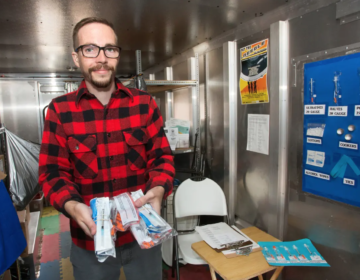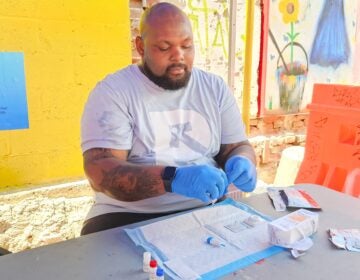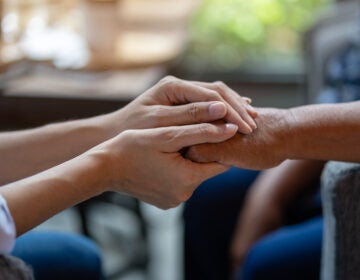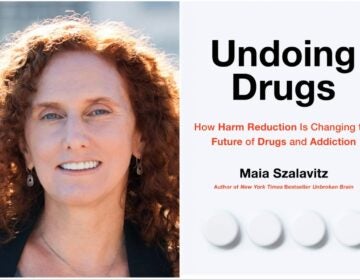Needle exchange programs need to expand, lawmakers say
Bill would create ‘harm reduction’ sites, allow state more control on placement.

File photo: March 24, 2016, a nurse holds one of the syringes provided to intravenous drug users taking part in a state-approved needle exchange program in Connersville, Indiana. (AP Photo/Rick Callahan)
A trio of Democratic lawmakers wants to change New Jersey’s syringe access law to expand the reach of these programs by eliminating the need for local approval, which has limited the number of sites in operation.
New Jersey now has seven needle exchange programs, although some have struggled to maintain a full schedule during the pandemic. These sites distribute clean needles to intravenous drug users, provide public health information, and serve as a conduit to other health and social services. The legislators also want to replace the historic terms “syringe access” and “needle exchange” with the more current “harm reduction.”
“New Jersey needs to get serious about addressing the clear gaps in our public health infrastructure that leave our loved ones battling addiction without the resources that they need to lead healthy lives,” said Assemblywoman Valerie Vainieri Huttle (D-Bergen), who sponsored the bill with Sen. Joe Vitale (D-Middlesex), a longtime advocate for these programs, and Sen. Vin Gopal (D-Monmouth).
Addiction and overdose numbers have continued to rise since the syringe access program was first established in New Jersey in 2006 and, while drug-related deaths had begun to level off, rates have spiked during the COVID-19 pandemic, the lawmakers noted. To build support for the proposal, Vainieri Huttle and Vitale plan to join the New Jersey Harm Reduction Coalition for an online event Tuesday with health care and policy experts and individuals impacted by addiction.
“The COVID-19 pandemic has increased the urgency of maintaining and expanding harm reduction services. Now more than ever, harm reduction expansion is critical,” the legislation reads. It also notes that federal statistics show 13% of United States residents have started or increased substance use since the emergence of the novel coronavirus.
What would change?
The legislation, introduced Oct. 8 in the Senate, would update the 2006 law — sponsored by Vitale and Sen. Nia Gill (D-Essex) that created the first needle-exchange pilot program in New Jersey. The initiative struggled to get off the ground under Gov. Chris Christie, a Republican who was skeptical of its value, but it was made permanent in 2016. Advocates for the program note that local opposition, or NIMBY-ism (Not In My Backyard), also limited its growth over the years.
The statute currently requires the local governing body to formally approve a program operating within its jurisdiction, with state oversight. The new legislation (S-3009) would instead put the state Department of Health in charge, allowing it to decide when and where a program is warranted — in consultation with local officials — and contract with a nonprofit entity or health care provider to run it. The DOH could also suspend operations, if it sees fit.
“Prior to establishing a harm reduction program in a municipality, the commissioner shall meet with the municipality’s mayor and council, as appropriate, in-person or through video or phone conference, and present to the municipality detailed plans for the harm reduction program, including information on the expected benefits from the establishment of a harm reduction program,” it reads.
“The commissioner shall maintain direct and open communication with the municipality prior to and during the establishment of a harm reduction program in the municipality and shall promptly respond to concerns and other issues raised by the municipality,” the bill states.
Do these programs work?
Syringe access programs initially were created in part to reduce the spread of infectious disease, like HIV/AIDS or hepatitis C, which is common among IV-drug users. But they do more than distribute clean “works,” or the clean needles and other equipment needed to safely inject heroin or other drugs. Each site has a specially trained nurse to advise clients and help with basic clinical issues, like wound care or vaccinations, and connect them with other health care — or addiction treatment — as needed.
“The principles of harm reduction are simple. We must accept that there is drug use in our communities,” Vitale said. “We need to meet people where they are, rather than forcing on them some preconceived notion of what their life should look like,” he added. “Harm reduction programs use compassion first, without judgment.”
The new legislation underscores the need for harm reduction programs to serve as a conduit for a wide range of other services, from housing to preventive health care, and for an approach that treats clients with dignity and respect. It also notes that studies show harm reduction programs can reduce the incidence of infections by 50% or more, help drug users avoid risky, possibly illegal behaviors, and serve as a bridge to treatment for those who are ready.
“Harm reduction programs do not promote drug use and do not minimize the harm and danger associated with lawful and unlawful drug use. Individuals utilizing harm reduction programs are often ill, in pain, have experienced trauma, and are served by professionals who offer services with compassion and without judgment,” the proposal reads. “There is evidence demonstrating that crime does not increase in areas surrounding harm reduction programs.”
Where are the existing sites?
Under Gov. Phil Murphy, a Democrat, syringe access has become more of an administration priority. The DOH now maintains a program page on its website, with background on the policy and contact information for the seven existing sites. The department’s division of HIV, sexually transmitted diseases, and tuberculosis services oversees the statewide programs.
Needle exchanges have been established in Asbury Park, Atlantic City, Camden, Jersey City, Newark, Paterson and Trenton, but some sites have had to reduce operations during the pandemic because of limited staff and a lack of protective equipment, like masks and gowns. Individual operations are run by local, regional or statewide nonprofits, like the Hyacinth AIDS Foundation, which oversees the work in Jersey City, Paterson and Trenton.
WHYY is your source for fact-based, in-depth journalism and information. As a nonprofit organization, we rely on financial support from readers like you. Please give today.





